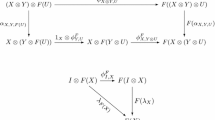Abstract
Starting from the observation that distinct notions of copying have arisen in different categorical fields (logic and computation, contrasted with quantum mechanics ) this paper addresses the question of when, or whether, they may coincide.
Provided all definitions are strict in the categorical sense, we show that this can never be the case. However, allowing for the defining axioms to be taken up to canonical isomorphism, a close connection between the classical structures of categorical quantum mechanics, and the categorical property of self-similarity familiar from logical and computational models becomes apparent.
The required canonical isomorphisms are non-trivial, and mix both typed (multi-object) and untyped (single-object) tensors and structural isomorphisms; we give coherence results that justify this approach.
We then give a class of examples where distinct self-similar structures at an object determine distinct matrix representations of arrows, in the same way as classical structures determine matrix representations in Hilbert space. We also give analogues of familiar notions from linear algebra in this setting such as changes of basis, and diagonalisation.
Access this chapter
Tax calculation will be finalised at checkout
Purchases are for personal use only
Preview
Unable to display preview. Download preview PDF.
Similar content being viewed by others
References
Abramsky, S., Haghverdi, E., Scott, P.: Geometry of interaction and linear combinatory algebras. Mathematical Structures in Computer Science 12(5) (2002)
Abramsky, S., Heunen, C.: H*-algebras and nonunital frobenius algebras: First steps in infinite-dimensional categorical quantum mechanics. In: Clifford Lectures, AMS Proceedings of Symposia in Applied Mathematics, vol. 71, pp. 1–24 (2012)
Cockett, J.R.B., Lack, S.: Restriction categories i: categories of partial maps. Theoretical Computer Science 270, 223–259 (2002)
Coecke, B., Pavlovic, D.: Quantum measurements without sums. In: Chen, G., Kauffman, L., Lamonaco, S. (eds.) Mathematics of Quantum Computing and Technology. Chapman & Hall (2007) arxiv.org/quant-ph/0608035
Coecke, B., Pavlovic, D., Vicary, J.: A new description of orthogonal bases. Mathematical Structures in Computer Science 23, 555–567 (2013)
Danos, V., Regnier, L.: Local and asynchronous beta reduction. In: Proceedings of the Eighth Annual IEEE Symp. on Logic in Computer Science (1993)
Gilman, R.: Formal languages and infinite groups. In: Baumslag, G., Epstein, D., Gilman, R., Short, H., Sims, C. (eds.) Geometric and Computational Perspectives on Infinite Groups. Discrete Mathematics and Theoretical Computer Science, vol. 25, pp. 27–51. American Mathematical Society (1996)
Girard, J.-Y.: Linear logic. Theoretical Computer Science 50, 1–102 (1987)
Girard, J.-Y.: Geometry of interaction 1. In: Proceedings Logic Colloquium 1988, pp. 221–260. North-Holland (1988)
Girard, J.-Y.: Geometry of interaction 2: Deadlock-free algorithms. In: Martin-Löf, P., Mints, G. (eds.) COLOG 1988. LNCS, vol. 417, pp. 76–93. Springer, Heidelberg (1988)
Girard, J.-Y.: Geometry of interaction 3: Accommodating the additives. Advances in Linear Logic 222, 329 (1995)
Haghverdi, E.: A categorical approach to linear logic, geometry of proofs and full completeness. PhD thesis, University of Ottawa (2000)
Heunen, C.: On the functor l2. In: Coecke, B., Ong, L., Panangaden, P. (eds.) Computation, Logic, Games and Quantum Foundations. LNCS, vol. 7860, pp. 107–121. Springer, Heidelberg (2013)
Hines, P.: The algebra of self-similarity and its applications. PhD thesis, University of Wales, Bangor (1997)
Hines, P.: The categorical theory of self-similarity. Theory and Applications of Categories 6, 33–46 (1999)
Hines, P.: A categorical analogue of the monoid semi-ring construction. Mathematical Structures in Computer Science 23(1), 55–94 (2013)
Hines, P.: Coherence in hilbert’s hotel (2013) ar**v:1304.5954
Hines, P.: Girard’s!( ) as a reversible fixed-point operator (2013) ar**v:1309.0361 [math.CT]
Hines, P.: Types and forgetfulness in categorical linguistics and quantum mechanics. In: Grefenstette, E., Heunen, C., Sadrzadeh, M. (eds.) Categorical Information Flow in Physics and Linguistics, pp. 215–248. Oxford University Press (2013)
Kock, J.: Elementary remarks on units in monoidal categories. Math. Proc. Cambridge Phil. Soc. 144, 53–76 (2008)
Lawson, M.V.: Inverse semigroups: the theory of partial symmetries. World Scientific, Singapore (1998)
Leinster, T.: A general theory of self-similarity. Advances in Mathematics 226, 2935–3017 (2011)
MacLane, S.: Categories for the working mathematician, 2nd edn. Springer, New York (1998)
Munn, W.D., Penrose, R.: A note on inverse semigroups. Mathematical Proceedings of the Cambridge Philosophical Society 51, 396–399 (1955)
Nivat, M., Perrot, J.: Une généralisation du monöide bicyclique. Comptes Rendus de l’Académie des Sciences de Paris 27, 824–827 (1970)
Pati, A.K., Braunstein, S.L.: Impossibility of deleting an unknown quantum state. Nature 404, 104 (2000)
Preston, G.B.: Representation of inverse semi-groups. J. London Math. Soc. 29, 411–419 (1954)
Wagner, V.V.: Generalised groups. Proceedings of the USSR Academy of Sciences 84, 1119–1122 (1952)
Wooters, W., Zurek, W.: A single quantum cannot be cloned. Nature 299, 802–803 (1982)
Høyer, P., Špalek, R.: Quantum fan-out is powerful. Theory of Computing 1, 81–103 (2005)
Author information
Authors and Affiliations
Editor information
Editors and Affiliations
Rights and permissions
Copyright information
© 2014 Springer-Verlag Berlin Heidelberg
About this chapter
Cite this chapter
Hines, P. (2014). Classical Structures Based on Unitaries. In: Casadio, C., Coecke, B., Moortgat, M., Scott, P. (eds) Categories and Types in Logic, Language, and Physics. Lecture Notes in Computer Science, vol 8222. Springer, Berlin, Heidelberg. https://doi.org/10.1007/978-3-642-54789-8_11
Download citation
DOI: https://doi.org/10.1007/978-3-642-54789-8_11
Publisher Name: Springer, Berlin, Heidelberg
Print ISBN: 978-3-642-54788-1
Online ISBN: 978-3-642-54789-8
eBook Packages: Computer ScienceComputer Science (R0)




